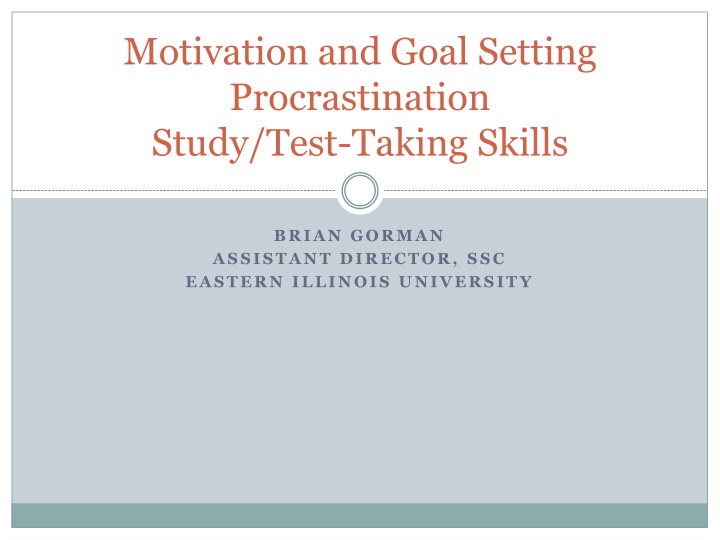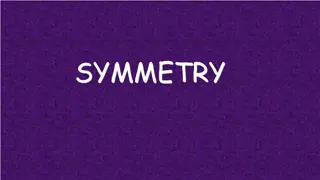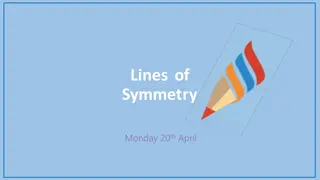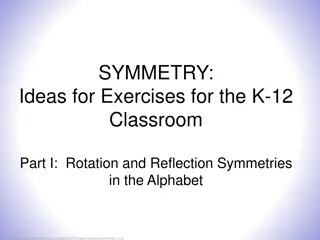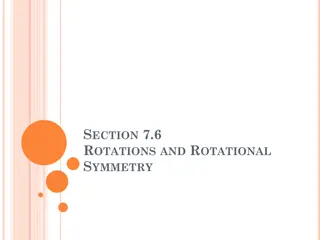Interactions in Research: Understanding Moderation and Symmetry
In research, interactions occur when the relationship between variables depends on another. This includes moderation, where one variable influences the relationship between a predictor and outcome. The symmetry of interaction emphasizes that either variable can be considered the predictor or moderator. Different types of interactions can involve various combinations of numeric, dichotomous, and multi-categorical variables. Understanding the interpretation of coefficients is crucial for making sense of these interactions.
Download Presentation

Please find below an Image/Link to download the presentation.
The content on the website is provided AS IS for your information and personal use only. It may not be sold, licensed, or shared on other websites without obtaining consent from the author.If you encounter any issues during the download, it is possible that the publisher has removed the file from their server.
You are allowed to download the files provided on this website for personal or commercial use, subject to the condition that they are used lawfully. All files are the property of their respective owners.
The content on the website is provided AS IS for your information and personal use only. It may not be sold, licensed, or shared on other websites without obtaining consent from the author.
E N D
Presentation Transcript
Motivation and Goal Setting Procrastination Study/Test-Taking Skills BRIAN GORMAN ASSISTANT DIRECTOR, SSC EASTERN ILLINOIS UNIVERSITY
Ask yourself these questions: Why am I here (in college)? What do I want to get out of this experience? Where do I see myself at the end of the semester, the year? Where do I see myself in 4 years, 10 years?
Which do you have the most value in? Motivation = Value X Expectation Whatever tasks/goals you have the most value in, those are the tasks/goals you are likely to achieve. However, you must also have a high expectation for yourself https://www.youtube.com/watch?v=Kave0ZOC47U&list=UUqA0jUAH_7QkB2o2typ3FpQ
Intrinsic vs. Extrinsic Motivation Intrinsic motivation from within Personal desire, curiosity, high value, achievement Extrinsic motivation from outside influences Grades, GPA, prestige, rewards Students with Intrinsic motivation are much more likely to succeed in the classroom
Extrinsic Motivation According to the US Census Bureau: College graduates earn an average of $1 million more than HS grads in a lifetime College graduates enjoy Higher savings levels Improved working conditions Increased personal and professional mobility Improved health and life expectancy Better lives for offspring Better consumer decisions Increased status More hobbies and leisure activities * Institute for Higher Education and the Carnegie Foundation 6/10 jobs require higher education # of jobs requiring advanced skills grow twice the rate of basic skills jobs
What other Extrinsic Motivators are there? Ability to not only graduate but get the job you want? Ability to live where you want? Provide a great life for your family? Big house, 5 cars, your own private island?
Intrinsic Motivation IF YOU DON T HAVE IT, HOW DO YOU GET IT?
Intrinsic Motivation If we satisfy our deficiency needs (bottom four), we have a much higher likelihood of developing an inner motivation Abraham Maslow s Hierarchy of Needs
SMART Goals Specific (and Strategic) more specific, easier to identify and reach WHO, WHAT? Measurable can you measure it? HOW? Attainable are they reasonable, realistic? Relevant your life role, focus on a single defined area EXPECTED RESULT? Time/Tangible clearly define a deadline/is it doable? WHEN?
Create your own SMART GOALS Life Role: student Create a SMART goal Create a list of things you can do to achieve the goal by your deadline BE DELIBERATE!! Short term ( 1-2 weeks) Middle (this semester, one year) Long term (graduation and beyond)
Create a Life Plan Complete a life plan for your role as a student My Dream: Do you have a dream? If not, I m searching My Role: Student My Long-Term Goals My Short-Term Goals
Procrastination We all procrastinate, you re not special Why do we procrastinate? Little value Temporal Discounting Dopamine (pleasure chemical) that other alternatives provide Lazy Fear of failure/unknown Poor self-esteem Poor time management/prioritization skills https://www.youtube.com/watch?v=1nBwfZZvjKo
So what can we do? Procrastination is a symptom, not a cause. Properly motivate Reward yourself for completing tasks early Pomodoro Technique 25 mins of work, reward yourself Positive Thinking enjoy the achievement Don t think: ugh, I have to study Do think: When I m finished here I will be prepared and enjoy myself later Create self imposed deadlines internal and external Create a list reminding yourself why you should finish early
Effective Test Taking Based on your Test-Taking Inventory, what changes can you make? Before, During, and after a Test Multiple Choice True-False Fill in the Blank Short Answer Matching
The Power of Choice Your quality of life is determined by the choices YOU make every day What would you like your quality of life to be? What is most important? What are you going to do about it?
